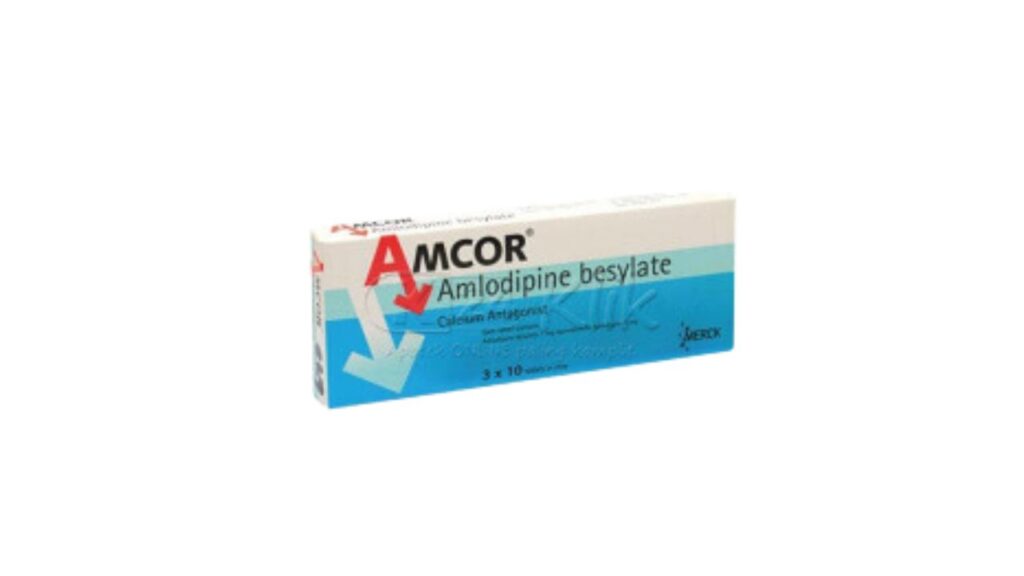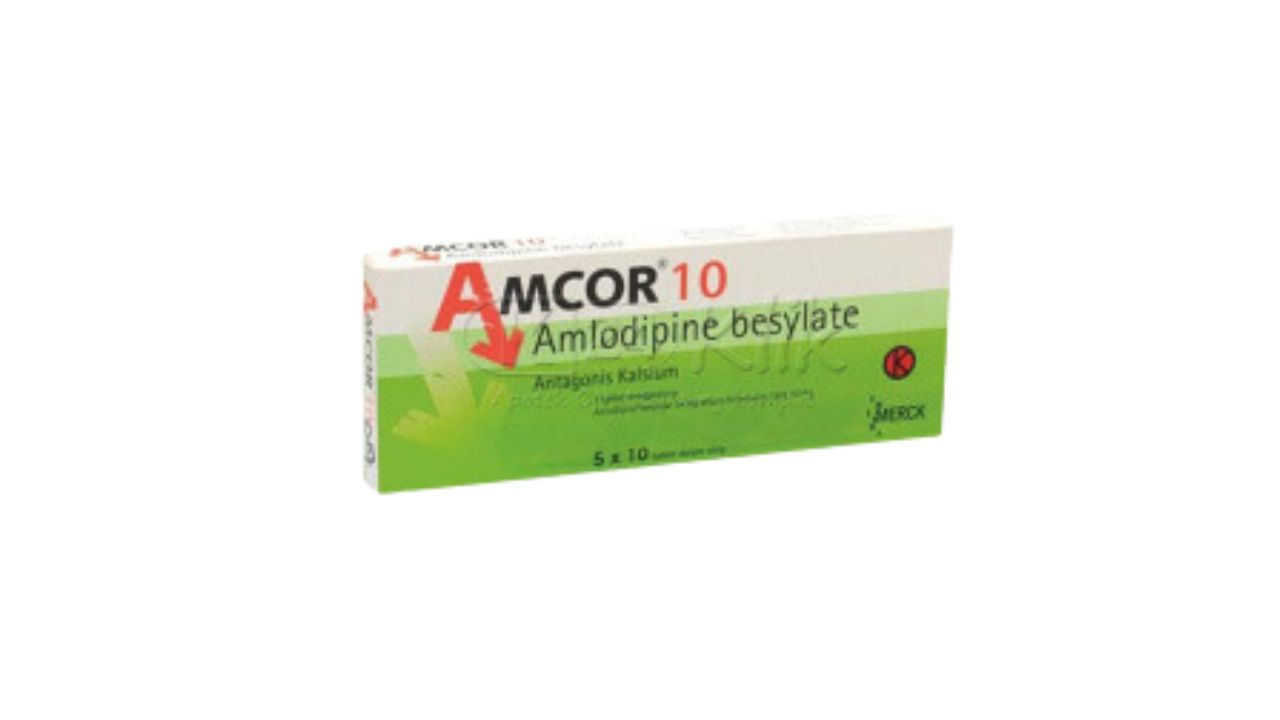Table of contents
What is Amcor Tablet?

Amcor Tablet is a prescription medication containing Amlodipine, used to treat high blood pressure (hypertension) and chest pain (angina).
It belongs to the Calcium Channel Blocker class, working by relaxing blood vessels and improving blood flow. Available in strengths of 2.5 mg, 5 mg, and 10 mg, the dosage is determined by a healthcare professional.
How does it work?
Amcor Tablet works by relaxing blood vessels, making it easier for blood to flow. It does this by blocking calcium, which helps lower high blood pressure and reduces chest pain (angina) by improving blood circulation to the heart.
Read – Buy Bedad Tablet – Uses, Dosage, Price & Side Effects
Amcor Tablet Uses
Amcor Tablet is primarily prescribed by the doctors to:
- Treat high blood pressure (hypertension).
- Manage long-term chest pain (angina) by improving blood supply to the heart.
- Address chest pain at rest (variant angina).
- Reduce the effects of damage in the heart blood vessels caused by Coronary Artery Disease.
Additionally, Amcor may be prescribed in combination with other medications to treat specific conditions as recommended by a doctor.
Read – Calcium and Vitamin D3 Tablets ip Uses in Hindi
Dosage & Usage Guidelines
1. Dosage for High Blood Pressure:
- Adults: Start with 5 mg once daily. The maximum daily dose is 10 mg.
- Children (6-17 years): Recommended starting dose is 2.5 mg/day, with a maximum of 5 mg/day.
- Older Adults: Initial dose may be 2.5 mg once daily.
2. Dosage for Long-term Chest Pain (Angina):
- Adults: Recommended dose is 5-10 mg once daily.
3. Dosage for Chest Pain at Rest (Variant Angina):
- Adults: Recommended dose is 5-10 mg once daily.
4. Dosage for Blockage of Coronary Arteries:
- Adults: Recommended dose is 5-10 mg once daily.
Important Instructions:
- Take as per doctor’s instructions.
- Usually taken with or without food.
- Avoid doubling up on doses.
- For long-term use, continue even if feeling well.
- Initial dose may be lower for those with liver issues.
What if i miss any dose?
If you forget to take any dose of Amcor Tablet, take it as soon as you remember it. However, if it’s close to your next scheduled dose, skip the missed one and continue with your regular dose. Avoid doubling up on doses.
Read – Limensee Tablet – Uses, Dosage, Price & Side Effects
What if overdose happen?
- Seek immediate medical attention in case of overdose.
- Symptoms may include low blood pressure and rapid heart rate.
Side Effects
Common Side Effects:
- Ankle swelling
- Constipation
- Diarrhea
- Dizziness
- Fatigue
- Headache
- Nausea
- Palpitations
- Sleepiness
- Stomach pain
Infrequent/Rare Side Effects:
- Abnormal dreams
- Abnormal vision
- Anxiety
- Back pain
- Chest pain
- Cough
- Depression
- Dry mouth
- Excessive sweating
- Eye pain
- Fainting
- Hair loss
- Increased thirst
- Skin rash
- Tremor
- Weight changes
Read – Nudex Capsule – Uses, Price, Dosage & Side Effects
How to resolve these side effects?
- Common Side Effects:
- Monitor the symptoms.
- If mild, they may resolve on their own.
- If persistent or bothersome, consult your healthcare provider.
- Infrequent/Rare Side Effects:
- Report unusual symptoms to your doctor.
- Seek medical advice for severe or persistent effects.
Precautions & Warnings
- Inform about heart disease, liver issues, or severe blood pressure increases.
- Avoid if allergic to Amcor or calcium channel blockers.
- Use during pregnancy only if benefits outweigh risks.
- Not recommended during breastfeeding.
- Use cautiously in severe low blood pressure conditions.
- Be cautious with narrowing of the aortic valve opening.
- May increase sensitivity to sunlight. Use sunscreen and limit sun exposure.
- Exercise caution while driving or operating machinery.
Read – Ulcox-MR Tablet Uses, Dosage, Side Effects & Warnings
Drug Interactions
- Lipid-Lowering Agents:
- Interacts with simvastatin. Consider reducing simvastatin dose when used with Amcor.
- Muscle Relaxant:
- Interaction with dantrolene may increase potassium levels. Avoid in fever and severe muscle contractions.
- CYP3A Inhibitors:
- Interacts with inhibitors like diltiazem, ketoconazole, verapamil, itraconazole, erythromycin, clarithromycin, ritonavir. Monitor and adjust Amcor dose accordingly.
- mTOR Inhibitors:
- Special precautions needed when used with temsirolimus, everolimus, sirolimus for cancer treatment. Increased risk of skin swelling.
- Immunosuppressant Drugs:
- Use with tacrolimus and cyclosporine may elevate blood levels. Adjust doses after kidney transplantation.
- CYP3A4 Inducers:
- Interaction with rifampicin and hypericum perforatum may alter Amcor levels. Monitor blood pressure and adjust doses accordingly.
Always inform your doctor of all medications, including over-the-counter drugs and supplements, to avoid potential interactions.
Frequently Asked Questions
Amcor helps with high blood pressure, chest pain, and heart conditions. It’s a type of medicine called a Calcium Channel Blocker.
Amcor relaxes blood vessels, makes blood flow easier, and gives more oxygen to the heart. It’s in the Calcium Channel Blocker group.
Sometimes, but tell your doctor all your meds to avoid issues.
Maybe ankle swelling, dizziness, headache, or tiredness. If it bothers you, talk to your doctor.
Maybe during pregnancy if needed, but not while breastfeeding. Ask your doctor for advice.
Take it when you remember, but don’t double up. Ask your doctor if you’re not sure.


You must be logged in to post a comment.